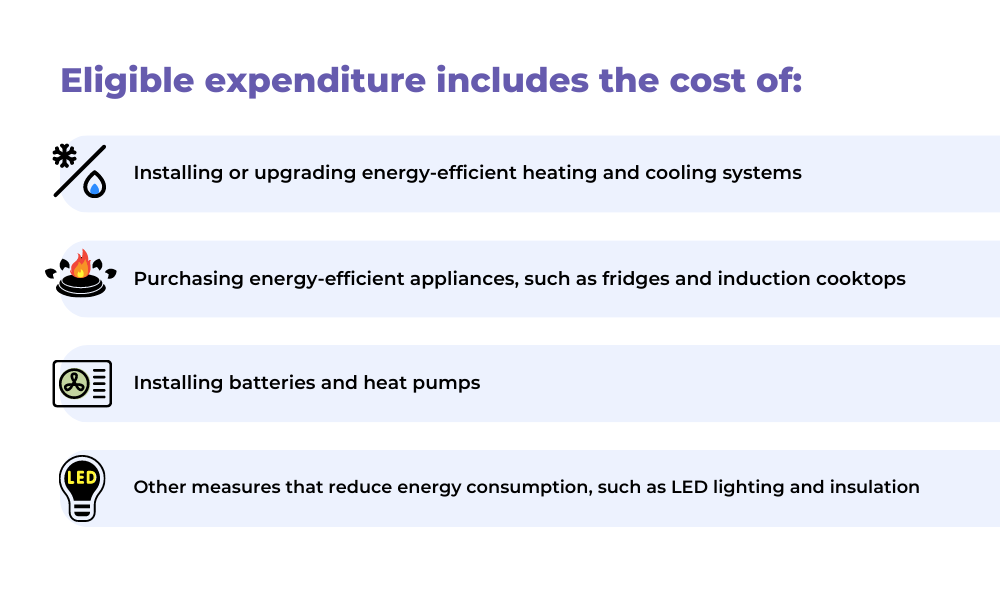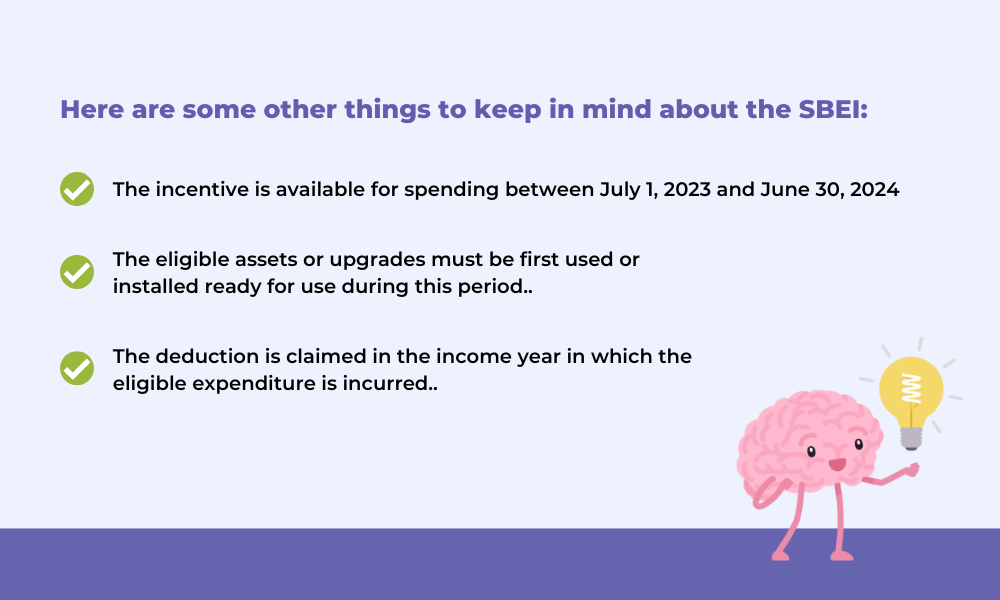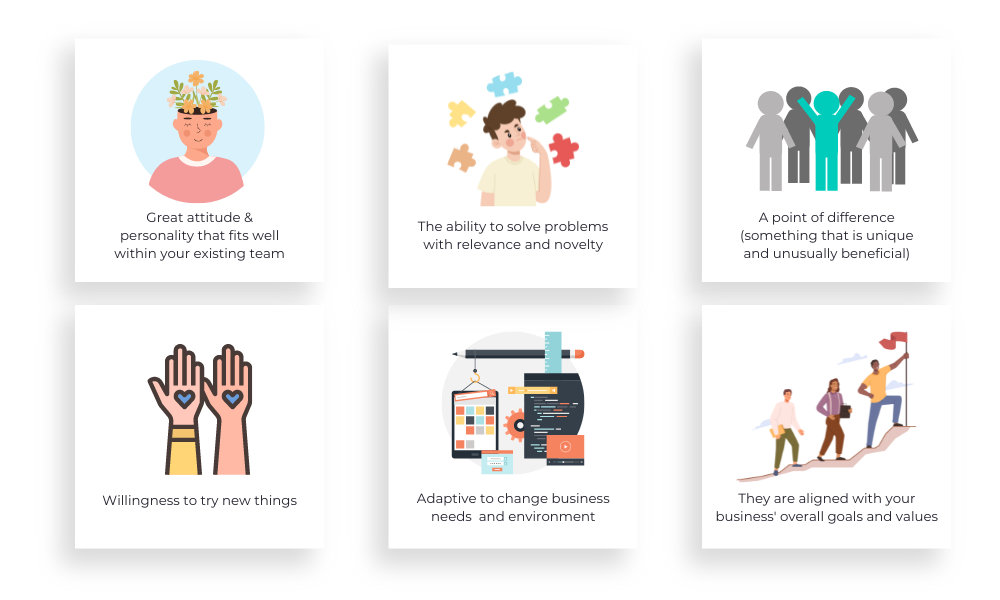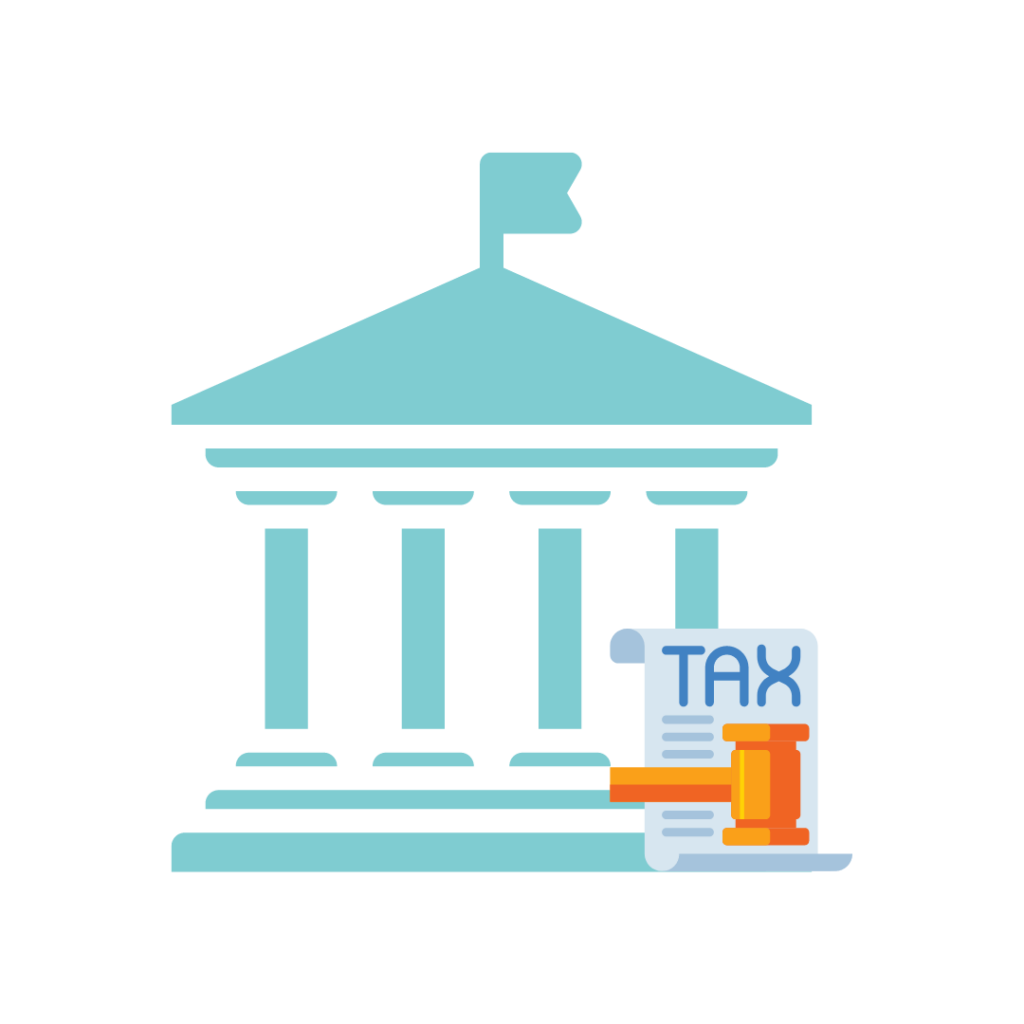Small Business Energy Incentive
The Australian government is offering a new tax break for small businesses that make energy-efficient investments. The Small Business Energy Incentive (SBEI) provides a bonus 20% deduction for eligible expenditure on assets that support electrification and more efficient use of energy.
The SBEI is available to businesses with an aggregated annual turnover of less than $50 million. Eligible expenditure includes the cost of:

The maximum deduction is $20,000, so you could save up to $20,000 in tax if you spend $100,000 on energy-efficient items.


The SBEI is a great way to save money and reduce your environmental impact. So if you’re thinking about making your business more energy-efficient, talk to your accountant about the SBEI today.
If you’re keen to explore changing accountants, we have a non-obligation process to do that. The first step is booking a strategy call with one of our accounting team. It’s a free 20-minute zoom or phone call where you get to meet us to manage your questions.
From that point, you can consider doing a “Look Under The Hood” with us. There is no obligation to change accountants, but we give you a second opinion if you’re paying too much tax.
Throughout that process, we can identify any problems we see with your current setup. Anything that your current accountant hasn’t claimed, or tax you may have overpaid, and strategies of how we might fix that going forward. We can run through with you once you book with us.
Stop Wasting Time On $25 An Hour Tasks

On a recent webinar, we had the pleasure of hosting Sean Soole on the topic, “Transitioning from Stagnation to Empowerment in Your Business.”
Here’s what he said –
My favourite thing is to stop doing $25-an-hour tasks. And for those of you who rely on notifications, consider giving them a little break. Trust me, they can be a $25-an-hour distraction. Whether it’s your phone, computer, or any other device chiming in, those constant dings and buzzes have a way of pulling you away from the important stuff. So, think about switching off those alerts for a while and regain your focus. We should only use notifications for their intended purpose, which is to serve as tools that enhance our task-execution abilities.
There are a few people that I’ve come across, who have the time, but not enough money yet. And that’s great because you’ve got the time to invest in other things that can produce the money.
One of the issues people often face is that they don’t have any time and don’t have any money. That’s the worst scenario that you can be in. You’ve built this machine that you need to keep running, but it’s not producing enough money for you. That tipping point is where we need to apply some of the lessons such as stepping away from $25 an hour of work and doing the stuff that’s worth $500 an hour or more. What strategically could you do if you had more time?
If you’re keen to explore changing accountants, we have a non-obligation process to do that. The first step is booking a strategy call with one of our accounting team. It’s a free 20-minute zoom or phone call where you get to meet us to manage your questions.
From that point, you can consider doing a “Look Under The Hood” with us. There is no obligation to change accountants, but we give you a second opinion if you’re paying too much tax.
Throughout that process, we can identify any problems we see with your current setup. Anything that your current accountant hasn’t claimed, or tax you may have overpaid, and strategies of how we might fix that going forward. We can run through with you once you book with us.
Why Lodging Your BAS On Time Is Important

We can appreciate that receiving a BAS from your accountant can be overwhelming, especially if you do not have the required funds to pay by the due date. You may opt not to sign the BAS because it’s less stressful than the ATO, knowing you have to pay $XXX, potentially adding to existing debt.
As tax agents, we work with the ATO daily, and they have a far softer approach with clients that lodge on time and have debt compared to late lodgers. Lodging your BAS on time demonstrates compliance and provides transparency to the ATO about your financial situation, making it easier to negotiate payment plans. It can also help you avoid additional penalties and interest charges for late lodgement.
This applies to BASs and other returns, so always opt to lodge your ATO obligations on time.
If you’re keen to explore changing accountants, we have a non-obligation process to do that. The first step is booking a strategy call with one of our accounting team. It’s a free 20-minute zoom or phone call where you get to meet us to manage your questions.
From that point, you can consider doing a “Look Under The Hood” with us. There is no obligation to change accountants, but we give you a second opinion if you’re paying too much tax.
Throughout that process, we can identify any problems we see with your current setup. Anything that your current accountant hasn’t claimed, or tax you may have overpaid, and strategies of how we might fix that going forward. We can run through with you once you book with us.
Choosing Right People In Your Business

Picking a winning team in business requires a combination of art and science. Selecting a team with diverse skill sets and experiences and individuals who can work well together and communicate effectively is vital.
Choosing individuals that are great in their roles will only take you so far.
Attributes you should consider when looking at hiring are:

If you’re keen to explore changing accountants, we have a non-obligation process to do that. The first step is booking a strategy call with one of our accounting team. It’s a free 20-minute zoom or phone call where you get to meet us to manage your questions.
From that point, you can consider doing a “Look Under The Hood” with us. There is no obligation to change accountants, but we give you a second opinion if you’re paying too much tax.
Throughout that process, we can identify any problems we see with your current setup. Anything that your current accountant hasn’t claimed, or tax you may have overpaid, and strategies of how we might fix that going forward. We can run through with you once you book with us.
In a few years, employers may be required to pay super at the same time as wages

The Federal Government has announced that it’s considering amending super laws to require super to be paid on payday. The change is set to take effect from 1 July 2026, and it will aim to stop disreputable employers from exploiting their employees and avoid liability building up on the books.
This change may affect your cash flow if you are paying super quarterly. We suggest a staggered approach to pay employees super in the next two years. Start by increasing the frequency of paying super from three months to two. Do this for six months, then increase frequency to one month until your pay cycle aligns with super payment.
If you’re keen to explore changing accountants, we have a non-obligation process to do that. The first step is booking a strategy call with one of our accounting team. It’s a free 20-minute zoom or phone call where you get to meet us to manage your questions.
From that point, you can consider doing a “Look Under The Hood” with us. There is no obligation to change accountants, but we give you a second opinion if you’re paying too much tax.
Throughout that process, we can identify any problems we see with your current setup. Anything that your current accountant hasn’t claimed, or tax you may have overpaid, and strategies of how we might fix that going forward. We can run through with you once you book with us.
Do You Have a HECS-HELP Loan?
The Australian Government indexes HECS-HELP loans each year on the 1st of June.

The Australian Government indexes HECS-HELP loans each year on the 1st of June. The percentage in which the debt amount will go up is directly linked to the cost of living (i.e. inflation).
On the 1st of June 2023, the HECS-HELP loans are predicted to increase by up to 7-8%. If you have a HECS-HELP loan, consider making an early payment before 1 June 2023 if cash flow permits. Individuals with low balances might be tempted to clear their HECS-LOAN balance altogether.
If you’re keen to explore changing accountants, we have a non-obligation process to do that. The first step is booking a strategy call with one of our accounting team. It’s a free 20-minute zoom or phone call where you get to meet us to manage your questions.
From that point, you can consider doing a “Look Under The Hood” with us. There is no obligation to change accountants, but we give you a second opinion if you’re paying too much tax.
Throughout that process, we can identify any problems we see with your current setup. Anything that your current accountant hasn’t claimed, or tax you may have overpaid, and strategies of how we might fix that going forward. We can run through with you once you book with us.
The Final ATO Ruling Affecting Trust Distributions

The ATO has finalised the section 100A ruling, which provides guidelines and a compliance approach to trust distributions. In essence, the ATO is concerned that the adult beneficiary who’s been made entitled to a trust distribution does not enjoy the economic benefit. More importantly, section 100A also focuses on taxpayers that enter into an arrangement that is not considered ordinary family or commercial dealing but merely a scheme to seek a tax benefit.
The ATO’s compliance approach uses three colour zones to determine whether the arrangement is Low or High risk. There are White (Low), Green (Low) and Red (High) zones.
The ATO made many available examples of what arrangements would be considered low or high risk.
We will discuss how section 100A will impact our clients during tax planning and whether their existing arrangements are in the White, Green, or Red zone.
If you’re keen to explore changing accountants, we have a non-obligation process to do that. The first step is booking a strategy call with one of our accounting team. It’s a free 20-minute zoom or phone call where you get to meet us to manage your questions.
From that point, you can consider doing a “Look Under The Hood” with us. There is no obligation to change accountants, but we give you a second opinion if you’re paying too much tax.
Throughout that process, we can identify any problems we see with your current setup. Anything that your current accountant hasn’t claimed, or tax you may have overpaid, and strategies of how we might fix that going forward. We can run through with you once you book with us.
How To Cut Energy Waste And Save Money
Small Business Energy Incentive is not too dissimilar to the small business skills boosts and investment boosts that we saw last year introduced by the previous government.

Basically, it’s allowing you an extra 20% tax deduction for any expenses that are related to the use of the word “electrification” and more efficient use of energy.
They are trying to make sure that any appliances that you have are a bit more efficient. The things like heating and cooling systems. And if you upgrade it to more efficient fridges, induction cooktops, installing batteries and heat pumps. Anything that makes the use of energy a bit more efficient, will be eligible for what we call a 20% extra deduction.
There is a limit of up to a hundred thousand in total expenditure. The way that this was announced was for restaurants, hair dresses, or we’ve got anything that had used the premises. If you have things that are using electricity right now and you can make it a bit more efficient, this is where you’ll be able to get an extra $20,000 extra deduction there.
If you’re keen to explore changing accountants, we have a non-obligation process to do that. The first step is booking a strategy call with one of our accounting team. It’s a free 20-minute zoom or phone call where you get to meet us to manage your questions.
From that point, you can consider doing a “Look Under The Hood” with us. There is no obligation to change accountants, but we give you a second opinion if you’re paying too much tax.
Throughout that process, we can identify any problems we see with your current setup. Anything that your current accountant hasn’t claimed, or tax you may have overpaid, and strategies of how we might fix that going forward. We can run through with you once you book with us.
Your Last Chance To Carry Back Business Losses

This is the last year in which, if you have a loss in your company, you can carry that loss and apply it back to any prior years where you’ve made a profit.
There are limitations in how far back you can go, and there’s a process to that. If your company has gone through a loss this year, chat with your accountant and make sure that we get that tax offset. Essentially, you get a rebate on your tax bill for the prior years.
If you’re keen to explore changing accountants, we have a non-obligation process to do that. The first step is booking a strategy call with one of our accounting team. It’s a free 20-minute zoom or phone call where you get to meet us to manage your questions.
From that point, you can consider doing a “Look Under The Hood” with us. There is no obligation to change accountants, but we give you a second opinion if you’re paying too much tax.
Throughout that process, we can identify any problems we see with your current setup. Anything that your current accountant hasn’t claimed, or tax you may have overpaid, and strategies of how we might fix that going forward. We can run through with you once you book with us.
Finding Balance Within the Allocation of Profits within professional firms Guidelines PC 2021/4

The industries that are affected by the Allocation of Professional Firm Profits Guidelines are the service-based businesses where you are selling knowledge or expertise. If you are using a trust or a company to run your service-based business, they want to attribute as much money as they can in the expert’s (owner’s) name.
Let’s say Ben Walker runs Inspire; the more profit that ends up in his personal name, he gets taxed at a higher rate, and the less risk the ATO deems on potentially breaking these guidelines.
The guidelines provide a self-assessment risk framework broken into three zones:
- Green = low risk
- Amber = moderate risk
- Red = high risk
The higher the risk, the more resources the ATO will allocate to understand the existing arrangement and may request you to make the required adjustment. The ATO may proceed with an audit if the arrangements remain high risk.
It doesn’t mean 100% of your business’ profit needs to end up in your own name, but we need to find the balance that we see as fair where we sit within these rules.
If you’re keen to explore changing accountants, we have a non-obligation process to do that. The first step is booking a strategy call with one of our accounting team. It’s a free 20-minute zoom or phone call where you get to meet us to manage your questions.
From that point, you can consider doing a “Look Under The Hood” with us. There is no obligation to change accountants, but we give you a second opinion if you’re paying too much tax.
Throughout that process, we can identify any problems we see with your current setup. Anything that your current accountant hasn’t claimed, or tax you may have overpaid, and strategies of how we might fix that going forward. We can run through with you once you book with us.
Get Cashed Up


